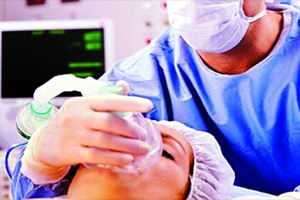Pain Undone
Dr. Meenal Patil,senior consultant anaesthetist,Sahyadri Speciality Hospital,informs us that Anaesthetists are experts in managing the three main life lines of any patient veins,wind pipe and nerves.

Dr. Meenal Patil,senior consultant anaesthetist,Sahyadri Speciality Hospital,informs us that Anaesthetists are experts in managing the three main life lines of any patient veins,wind pipe (trachea) and nerves. We dont just put the patient to sleep,thats just half of my work. The most important task that we have to perform is waking up that patient from the deep sleep .The patient after waking up should feel that the sleep was extremely relaxing and painless. He/ She must not be able to recall whatever happened during that sleep. During Anaesthesia complete immobility (except breathing) and full muscle relaxation are essential components. While the patient is asleep & the surgery is on the anaesthetist keeps minute watch on the functioning of his bodys important organs such as his heart,lungs and brain.
After passing MBBS,just like any other branch of Medicine & Surgery,we have to take up higher education at the university. D.A. (Diploma in Anesthesiology) can be received after two years of work experience of teaching in a medical institute & a recognized hospital,after passing the MBBS exam. After that,for two years we have to learn advanced techniques & study anesthesiology thoroughly (for all branches of surgery) to pass M.D. / DNB in Anesthesiology. We also have to research & present dissertation during that period.
Many people are afraid of the possibility of not waking up. But that happens rarely in very serious conditions. In such conditions the patients or his relatives are kept informed about such predictions before the operation itself,their written consent is taken & then only is the patient operated upon. If such a thing happens,the patient is given artificial breathing & transferred immediately to ICU,treated properly until he is fully awake & stable.Waking up during surgery is impossible during general anaesthesia because we can adjust the depth of Anaesthesia very easily. If we observe that the patient is coming out of anaesthesia we give more drugs to increase the depth of anaesthesia.
If a surgery on you is decided by a surgeon,he/she sends you to an anaesthetist. Anaesthetist examines you and advises the necessary investigations. If one suffers from illness like diabetes,high blood pressure,asthma then treatment needs to be continued so that the health is as fine as possible at the time of operation. The patients are not allowed to drink/eat at least for six hours before operation so that the stomach should be totally empty. You must reveal if one has any allergies / addictions. One must get his weight right,so that its easier to decide the dosage of drugs. Most of the anaesthetists dont have their own clinics only the ones who practice Pain Management have Pain Clinics.
Apart from the usual role,Anaesthetists can be ‘intensivists’ – that means the physicians of Intensive Care Units. Also we are specially trained for emergency procedures like resuscitating the patient if suddenly a persons circulation (heart) or breathing stops.